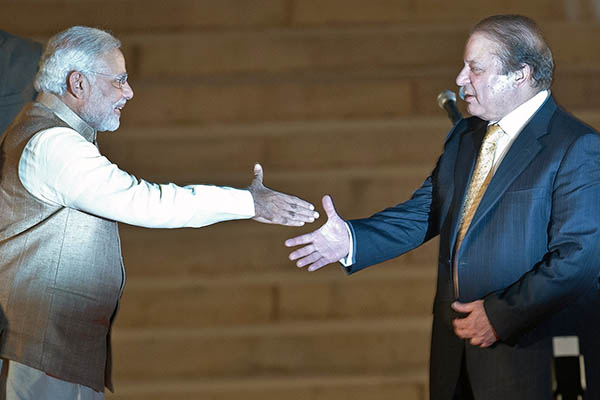Businessmen and traders are banking on improved ties boosting Pakistan’s economy.
Pakistanis on Monday voiced hope that Prime Minister Nawaz Sharif’s visit to India for Narendra Modi’s inauguration will lead to better ties between the two countries, despite concern over the Hindu hardliner’s past.
Modi invited his Pakistani counterpart to Monday’s ceremony in a bold initiative aimed at mending strained ties between the two neighbors.
Sharif said the trip was a “great opportunity” to strengthen ties, and in Pakistan’s major cities, many traders, shoppers and others shared his optimism, though some expressed concern over Modi’s past record. The 63-year-old Modi was chief minister of Gujarat state during the 2002 communal riots in which 1,000 people were killed, most of them Muslim.
Nisar Ahmed, a 48-year-old fabric worker in Islamabad, said: “It is good for the people of Pakistan and India to have peace, because our culture is the same.”
Others said they were hopeful that good ties with India could prove a boon to Pakistan’s own, much smaller economy. Trade between the two countries is presently around $2.5 billion, with Indian exports accounting for $1.75 billion, according to the Karachi Chamber of Commerce and Industry. Some $3 billion more is thought to be channeled through Dubai, almost all of which is Pakistani imports, though the business community believes that if Pakistan grants India Most Favored Nation (MFN) status the imbalance could change.
“Pakistan will get billions of dollars in benefit if it grants MFN status to India … It would also do away with many non-tariff barriers making Pakistani goods accessible to India,” said Amin Hashwani, a Karachi-based businessman.
Sharif, a pro-business industrialist, is widely seen as being in favor of such a move.
Amel Irfan, a recent graduate from Kinnaird College for Women in Lahore, said closer ties went beyond economics and it was time for Pakistan to re-evaluate its biggest threats, given its long struggle against homegrown insurgents. “It is also important for Pakistan to ensure that it makes peace with its neighbors because of the internal threat of terrorism it faces,” she said.
In the disputed territory of Kashmir, which the countries have fought two wars over, there was little hope of a breakthrough. “Modi has announced an increase in the defense budget after winning elections which is an alarming signal for the region,” said Sardar Attique Ahmed Khan, former prime minister of Pakistan-administered Kashmir.
Abdul Aziz Alvi, chief of the Kashmir chapter of the Jamaat-ud-Dawa militant group, said armed struggle would continue. “The meeting will have no impact on the issue of Kashmir, let them talk but the solution is only with Jihad.”

